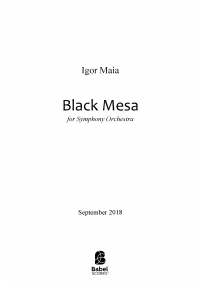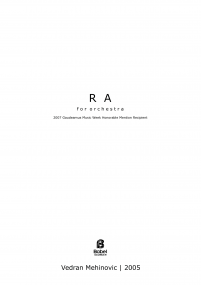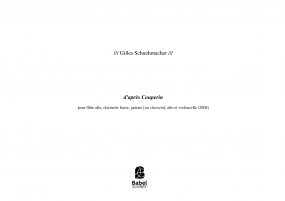Recherche avancée
Tableaux Vivants d'une resistance
17,51 €
Version papier (+20,30 € impression et livraison ). Colissimo7-14 days aprox.
Version numérique (+0,00 €) à télécharger
Chez BabelScores, quand vous achetez une partition, vous pouvez ensuite contacter directement le compositeur ici même !
Caractéristiques
Region
North America (Canada - USA)
Estimated Duration
16 - 20min
Date
2014
ISMN : 979-0-2325-1414-7
In Stock
Notes sur cette pièce
Tableaux Vivants d'une resistance
During June 2013, Turkey witnessed the widest civil unrest in its history. Initially the protests were sparked by the plans of a new urban development on a small city park but spread across the whole country in a matter of days. Among many other things, what was most significant about this civil movement was the involvement of every social and cultural strata of the society including the youngsters who were until then known as being non-aligned and apolitical. When I set out to write this piece, I wanted to dedicate it to these young people, just like the ones in the orchestra, who were on the streets year ago to defend their civil liberties and rights for a better future.The piece has grown out from the experience of the Gezi movement. However, it is neither a programmatic nor a depictive work and it doesn’t try to tell a story or give a message. It is more about the raw experience of the street action itself, about what it feels like to be in the middle of it. It is more about the sheer sonic and kinetic experience one feels. Being out on the streets with thousands of people chanting, screaming, running away from the police who were firing countless number of tear gas canisters, dousing people with jets of water is a terrifying but at the same time a uniquely vitalizing sonic experience that will stay with you forever. So the starting point of the piece was this sound world created by the masses of people and the police attacking them.The piece was never meant to be representational but there’s one metaphor that underlies the whole composition. That’s the relationship of the individual to the mass. In order to bring the orchestra to this world, I had to strip each instrument off its individuality and make everything contribute to a bigger whole. Most of the time, instrumental parts consist of nothing other that basic constructional shapes such as lines, dots and curves. But each of them are instrumental in forging something massive. This is sometimes a 30-40 voice harmony, sometimes a giant wave moving around frantically - similar to the crowds acting hysterically not knowing where to go, nevertheless acting unified. This is the model the orchestra usually imitates. When an instrument starts a pattern, the rest follows by building upon itself and puts it in a inevitable stance.One of the most memorable sonic experiences of Gezi was in fact a music concert. On June 12th, a pianist performed to the thousands of people who gathered at the park. What was interesting to me was not the music he played but hearing all too familiar sound of piano in the background noise of the crowds. That gave me the idea for the only programatic spot in the music. So towards the end of the piece, in midst of all the instrumental noise, something quite familiar is heard. That changes one’s perspective completely. Everything that was there before moves away from the centre of attention and becomes the background noise just like the sound of the crowds. But then the all too familiar is scraped off only to show its intrinsic qualities. So what was once familiar becomes foreign while changing its perception along the wayOnce I’ve heard a young performer complaining that despite the fact that they are young, most of the pieces they play are about death. So I would like to dedicate this piece to all these young people that have given hope to our lives.
Ajouter à une playlist
- Identifiez-vous pour créer une liste
Tableaux Vivants d'une resistance
During June 2013, Turkey witnessed the widest civil unrest in its history. Initially the protests were sparked by the plans of a new urban development on a small city park but spread across the whole country in a matter of days. Among many other things, what was most significant about this civil movement was the involvement of every social and cultural strata of the society including the youngsters who were until then known as being non-aligned and apolitical. When I set out to write this piece, I wanted to dedicate it to these young people, just like the ones in the orchestra, who were on the streets year ago to defend their civil liberties and rights for a better future.The piece has grown out from the experience of the Gezi movement. However, it is neither a programmatic nor a depictive work and it doesn’t try to tell a story or give a message. It is more about the raw experience of the street action itself, about what it feels like to be in the middle of it. It is more about the sheer sonic and kinetic experience one feels. Being out on the streets with thousands of people chanting, screaming, running away from the police who were firing countless number of tear gas canisters, dousing people with jets of water is a terrifying but at the same time a uniquely vitalizing sonic experience that will stay with you forever. So the starting point of the piece was this sound world created by the masses of people and the police attacking them.The piece was never meant to be representational but there’s one metaphor that underlies the whole composition. That’s the relationship of the individual to the mass. In order to bring the orchestra to this world, I had to strip each instrument off its individuality and make everything contribute to a bigger whole. Most of the time, instrumental parts consist of nothing other that basic constructional shapes such as lines, dots and curves. But each of them are instrumental in forging something massive. This is sometimes a 30-40 voice harmony, sometimes a giant wave moving around frantically - similar to the crowds acting hysterically not knowing where to go, nevertheless acting unified. This is the model the orchestra usually imitates. When an instrument starts a pattern, the rest follows by building upon itself and puts it in a inevitable stance.One of the most memorable sonic experiences of Gezi was in fact a music concert. On June 12th, a pianist performed to the thousands of people who gathered at the park. What was interesting to me was not the music he played but hearing all too familiar sound of piano in the background noise of the crowds. That gave me the idea for the only programatic spot in the music. So towards the end of the piece, in midst of all the instrumental noise, something quite familiar is heard. That changes one’s perspective completely. Everything that was there before moves away from the centre of attention and becomes the background noise just like the sound of the crowds. But then the all too familiar is scraped off only to show its intrinsic qualities. So what was once familiar becomes foreign while changing its perception along the wayOnce I’ve heard a young performer complaining that despite the fact that they are young, most of the pieces they play are about death. So I would like to dedicate this piece to all these young people that have given hope to our lives.
Instrumentation
flute (3)|oboe (2)|English Horn|Clarinet (3)|bassoon (2)|Contrabassoon|Horn (French Horn) (4)|Trumpet in C (3)|trombone (2)|bass trombone|Tuba|timpani|Percussions (3)|harp|Violin (2)|Viola|Cello|Double bass|Piano|
Recording
Bilkent Youth Orchestra conducted by Isin Metin
Score Details
Format - A3 / tabloid
Pages - 60
Pages - 60








